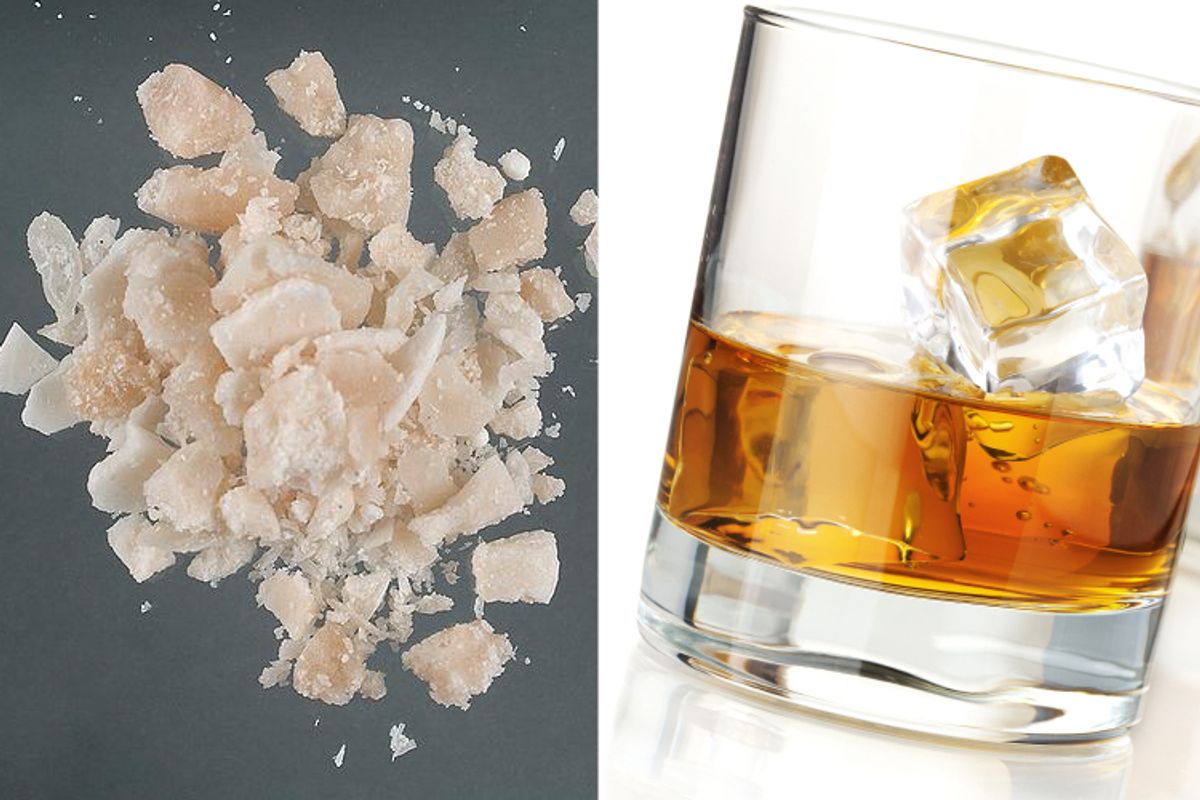What's worse than crack or heroin? How about Coors Light? According to a sure-to-be-contentious study released by the Lancet on Monday, alcohol is beating the pants off an array of deadly illegal substances as the "most harmful" drug in the United Kingdom.
The Lancet study was based on specific sets of criteria for what causes the most damage -- and while alcohol did get Best in Show by a wide margin in terms of overall harm and harm to others, heroin, crack and methamphetamine still kicked butt in the Most Damaging to Individuals event. But out of a possible overall harmfulness rating of 100 points, alcohol scored an impressive 72, with heroin and crack trailing with 55 and 54 points, respectively. The study authors add that the findings confirm, "Aggressively targeting alcohol harms is a valid and necessary public health strategy." And though the study was focused on British substance use, you have to wonder, how long before we're going to have to start seeing images of cancerous livers at Sherry-Lehmann? How long before the pot lobby seizes on this nugget of info as proof we need to legalize marijuana, which barely even ranked? Oh, I see, that one already happened.
There's no denying the devastating impact of alcohol abuse. Drunk driving, socially sanctioned bingeing, alcohol-related crime, and the numerous health problems associated with chronic drinking -- and the toll they take on our insurance premiums -- are nothing to sneeze it. But while study coauthor Leslie King says, "What governments decide is illegal is not always based on science" (and that "drugs that are legal cause at least as much damage, if not more, than drugs that are illicit"), is it a fair comparison? Our entire historical and cultural relationship with alcohol is different than our one with, say, crack. That's why we have a Food & Wine magazine and we don't have a Food & Crack one. That's why there's no Meth Enthusiast.
Illicit substances – even ones we may argue should not be illicit -- are harder to obtain, carry penalties for possession, and in many cases, have a stigma attached. They can decimate the hell out of a person's life, but in terms of societal impact, they're in a very different league from alcohol. The distinctive and potentially insidious thing about booze is that it's not as clear-cut as "just say no." Nobody is going to bust in and tell us to step away from the sauvignon blanc. The choice is ours.
Back in June, Judith Warner argued in the New York Times on the perils of living in "Deregulation Nation," warning that "problems of self-regulation -- of appetite, emotion, impulse and cupidity -- may well be the defining social pathology of our time." Our global -- and frequently losing -- war against excess is fought in different theaters. Eating disorders and obesity are racking up an increasingly tragic body count, but we all still need to eat. We can look at certain pharmaceuticals and say they need to come with warnings. We can look at tobacco and decide to limit where it's consumed and whom it's sold to. And I haven't yet heard a persuasive argument in favor of freebasing.
In life there's the "never" pile, the "sometimes," and the "figure out how to deal with it every day" one. It's that second one that can be so hard to navigate. At one end of the spectrum, we have entire religions that don't permit the consumption of alcohol, 12-step groups to help abusers refrain from it one day at a time, and plenty of people who, for a variety of personal, philosophical and health reasons, just don't drink. At the other end: Whooooo, body shots and Ke$ha songs! Hence we can build vacations around wine tasting and Oktoberfest and also have people like Mel Gibson, who admit to having battled "the disease of alcoholism for all of my adult life."
When it comes to things we ourselves have control over, without legal or social sanctions, it seems the middle path is often the hardest one to fit into the needs and expectations of society. So if the Lancet study raises awareness of alcohol abuse and encourages a trend toward healthier, more responsible consumption, that's a victory for everybody. If, however, it goes down the road of beer shaming, it's pretty ridiculous. And trying to quantify the impact of a legal substance that can be consumed in moderation against hard illegal drugs? Lancet, you'd have to be high.

Shares